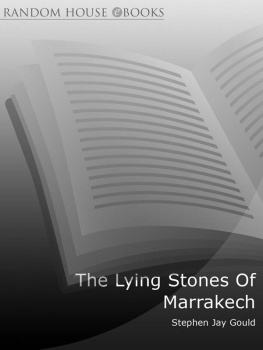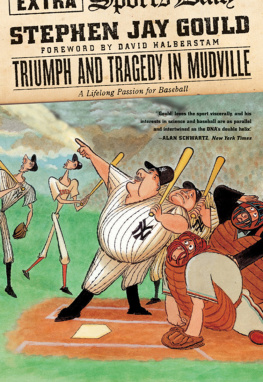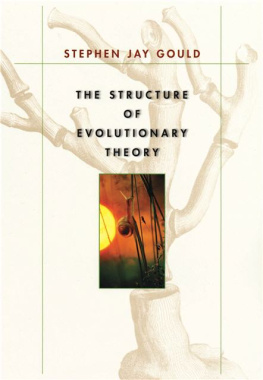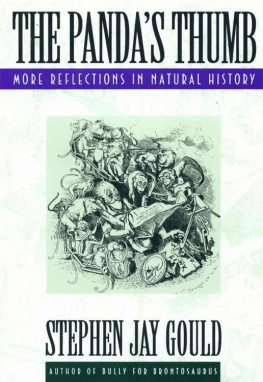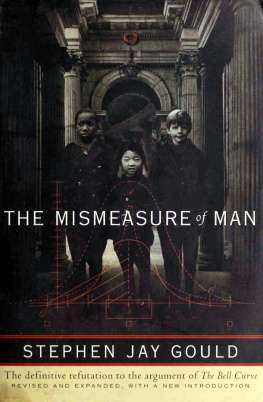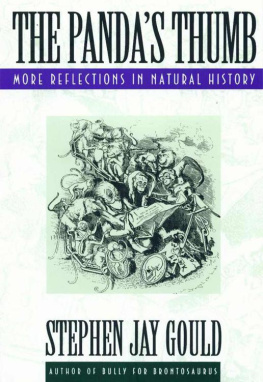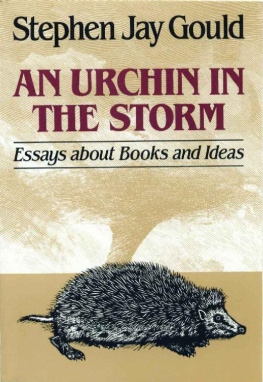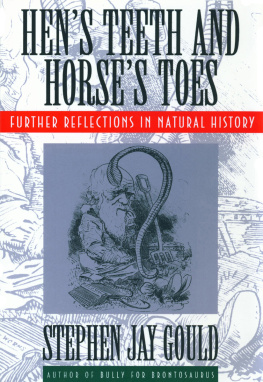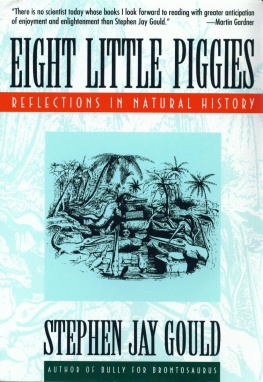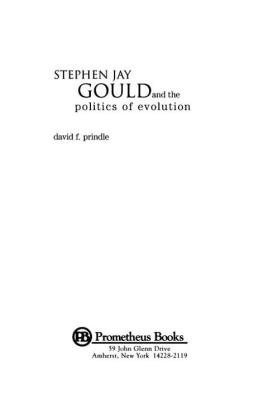Stephen Jay Gould
T HE L YING S TONES
OF M ARRAKECH
Penultimate Reflections
in Natural History

This eBook is copyright material and must not be copied, reproduced, transferred, distributed, leased, licensed or publicly performed or used in any way except as specifically permitted in writing by the publishers, as allowed under the terms and conditions under which it was purchased or as strictly permitted by applicable copyright law. Any unauthorised distribution or use of this text may be a direct infringement of the authors and publishers rights and those responsible may be liable in law accordingly.
Version 1.0
Epub ISBN 9781409000341
www.randomhouse.co.uk
Published by Vintage 2001
2 4 6 8 10 9 7 5 3 1
Copyright Turbo, Inc. 2000
Stephen Jay Gould has asserted his right under the Copyright, Designs and Patents Act 1988 to be identified as the author of this work
This book is sold subject to the condition that it shall not by way of trade or otherwise, be lent, resold, hired out, or otherwise circulated without the publishers prior consent in any form of binding or cover other than that in which it is published and without a similar condition including this condition being imposed on the subsequent purchaser
All of the essays contained in this work were previously published by Natural History magazine
First published in Great Britain by Jonathan Cape 2000
Vintage Random House, 20 Vauxhall Bridge Road, London SW1V 2SA
Random House Australia (Pty) Limited 20 Alfred Street, Milsons Point, Sydney New South Wales 2061, Australia
Random House New Zealand Limited 18 Poland Road, Glenfield, Auckland 10, New Zealand
Random House (Pty) Limited Endulini, 5A Jubilee Road, Parktown 2193, South Africa
The Random House Group Limited Reg. No. 954009 www.randomhouse.co.uk
A CIP catalogue record for this book is available from the British Library
ISBN 0 09 928583 5
Papers used by Random House are natural, recyclable products made from wood grown in sustainable forests. The manufacturing processes conform to the environmental regulations of the country of origin
Printed and bound in Great Britain by Cox & Wyman Limited
C ONTENTS
I E PISODES IN THE B IRTH OF P ALEONTOLOGY
The Nature of Fossils and the History of the Earth
II P RESENT AT THE C REATION
How Frances Three Finest Scientists Established Natural History in an Age of Revolution
III D ARWINS C ENTURYAND O URS
Lessons from Britains Four Greatest Victorian Naturalists
For Jack Sepkoski (19481999),
who brought me one of the greatest possible joys
a teacher can ever earn or experience:
to be surpassed by his students.
Offspring should not predecease their parents,
and students should outlive their teachers.
The times may be out of joint,
but Jack was born to set the order of lifes history right
and he did!
ALSO BY STEPHEN JAY GOULD
Ontogeny and Phylogeny
Ever Since Darwin
The Pandas Thumb
The Mismeasure of Man
Hens Teeth and Horses Toes
The Flamingo Smile
An Urchin in the Storm
Times Arrow, Times Cycle
Illuminations
(with R W Purcell)
Finders, Keepers
(with R W Purcell)
Eight Little Piggies
Dinosaur in a Haystack
Lifes Grandeur
Questioning the Millennium
Leonardos Mountain of Clams and the Diet of Worms
Wonderful Life
Bully for Brontosaurus
T HE L YING S TONES
OF M ARRAKECH
Stephen Jay Gould is the Alexander Agassiz Professor of Zoology and Professor of Geology at Harvard University, and the Vincent Astor Visiting Professor of Biology at New York University. His publications include Ever Since Darwin, Eight Little Piggies, Lifes Grandeur, Questioning the Millennium, Leonardos Mountain of Clams and the Diet of Worms, Bully for Brontosaurus and Wonderful Life. Wonderful Life won the Science Book Prize for 1991.
P REFACE
In the fall of 1973, I received a call from Alan Ternes, editor of Natural History magazine. He asked me if I would like to write columns on a monthly basis, and he told me that folks actually get paid for such activities. (Until that day, I had published only in technical journals.) The idea intrigued me, and I said that Id try three or four. Now, 290 monthly essays later (with never a deadline missed), I look only a little way forward to the last item of this extended seriesto be written, as number 300 exactly, for the millennial issue of January 2001. One really should follow the honorable principle of quitting while still ahead, a rare form of dignity chosen by such admirable men as Michael Jordan and Joe DiMaggio, my personal hero and mentor from childhood. (Joe died, as I put this book together, full of years and in maximal style and grace, after setting one last recordfor number of times in receiving last rites and then rallying.) Our millennial transition may represent an arbitrary imposition of human decisions upon natures true cycles, but what grander symbol for calling a halt and moving on could possibly cross the path of a mans lifetime? This ninth volume of essays will therefore be the penultimate book in a series that shall close by honoring the same decimal preference lying behind our millennial transition.
If this series has finally found a distinctive voice, I have learned this mode of speech in the most gradual, accumulating, and largely unconscious manner against my deepest personal beliefs in punctuational change and the uniquely directive power (despite an entirely accidental origin) of human reason in evolution. I suppose I had read a bit of Montaigne in English 101, and I surely could spell the word, but I had no inkling about the definitions and traditions of the essay as a literary genre when Alan Ternes called me cold on that fine autumn day.
I began the series with quite conventional notions about writing science for general consumption. I believed, as almost all scientists do (by passively imbibing a professional ethos, not by active thought or decision), that nature speaks directly to unprejudiced observers, and that accessible writing for nonscientists therefore required clarity, suppression of professional jargon, and an ability to convey the excitement of fascinating facts and interesting theories. If I supposed that I might bring something distinctive to previous efforts in this vein, I managed to formulate only two vague personal precepts: first, I would try to portray all subjects at the same conceptual depth that I would utilize in professional articles (that is, no dumbing down of ideas to accompany necessary clarification of language); second, I would use my humanistic and historical interests as a user friendly bridge to bring readers into the accessible world of science.
Over the years, however, this mere device (the humanistic bridge) became an explicit centrality, a feature that I permitted myself to accept (and regard as a source of comfort and pride rather than an idiosyncrasy to downplay or even to hide) only when I finally realized that I had been writing essays, not mere columns, all alongand that nearly five hundred years of tradition had established and validated (indeed, had explicitly defined) the essay as a genre dedicated to personal musing and experience, used as a gracious entre, or at least an intriguing hook, for discussion of general and universal issues. (Scientists are subtly trained to define the personal as a maximally dangerous snare of subjectivity and therefore to eschew the first person singular in favor of the passive voice in all technical writing. Some scientific editors will automatically blue-pencil the dreaded

